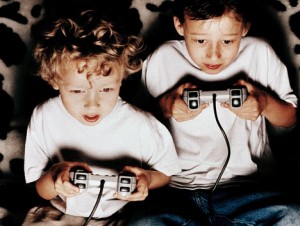The concept of video games – interactive electronic devices that one can compete with – is now well established in everyday life. The science of designing games has advanced to the point that a designer can actually lead the player to think & feel in certain ways. Sometimes the evoked state is noxious – for instance desensitizing a player to the horrors of violence. Other times the evoked state can alter gender-specific neurophysiologic activity. And sometimes the evoked state is intended to be therapeutic – for instance the brain-training programs like neurofeedback or cognitive rehabilitation.
Video games can alter our ability to be distracted from a task – in 2007 Green & Bavelier reported that “playing action video games can alter fundamental characteristics of the visual system, such as the spatial resolution of visual processing across the visual field“ and that “action-video-game players could tolerate smaller target-distractor distances” (which means that it would be more difficult to get the attention of a {hyper focused} gamer.









